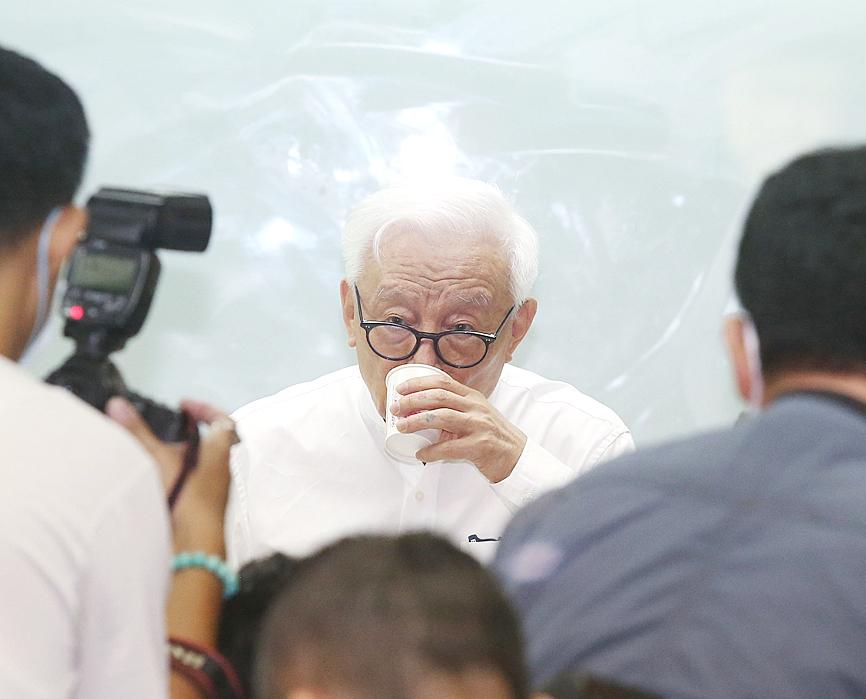Robert Tsao (曹興誠), founder of contract chipmaker United Microelectronics Corp (UMC), yesterday pledged to donate NT$3 billion (US$100.17 million) to help Taiwan bolster its defenses as China launched intensive military drills around Taiwan.
Tsao, who gave up his Republic of China (ROC) citizenship to migrate to Singapore in 2011 in part because of lingering dismay over government restrictions on UMC’s ability to invest in China, has recently become a vocal critic of Beijing.
At a news conference in Taipei, the entrepreneur described Chinese maneuvers as “unbearable insolence” and said the donation would be aimed at shoring up Taiwan’s security and defense posture.

Photo: CNA
The funds would support defense education for individuals or groups to help Taiwan resist Beijing’s cognitive and psychological warfare campaigns, and also go toward countering Chinese Communist Party (CCP) cyberattacks and hacking activities against Taiwan, he said.
Tsao said he was still thinking about how the funds would be used, but suggested that the establishment of a foundation could be an option.
In a statement he released separately yesterday, Tsao called the CCP a “hooligan” and a “local ruffian,” and he urged Taiwanese advocating unification with China to “draw a clear line” and keep a distance from the authoritarian regime.
A normal civilized country should value human rights, the rule of law, democracy and freedom, but “the CCP advocates totalitarianism, deceit, hatred and violence,” Tsao said.
“Everyone should understand that I am not doing it [the donation] for the sake of fame or fortune. I’m not interested in politics or elections, either,” he said. “I just hate the CCP’s lies and violence, and hope to leave a piece of pure land and a blue sky in Taiwan for those who speak Chinese.”
Tsao’s attacks against China sharply contrast with his behavior when he ran UMC more than 15 years ago.
He led a team to set up Hejian Technology (Suzhou) Co in China’s Jiangsu Province in 2001, which triggered an investigation by the Democratic Progressive Party (DPP) government at the time led by then-president Chen Shui-bian (陳水扁).
Because of the investment in Hejian, UMC was charged with breach of trust and violation of the Business Entity Accounting Act (商業會計法) in 2005, but was found not guilty in 2010.
Tsao stepped down as chairman of UMC in 2005.
In January 2011, Tsao, who was unhappy with the DPP’s crackdown on UMC’s investment in China, accepted an invitation from the Singaporean government to obtain Singaporean citizenship, giving up his ROC citizenship in the process.
In 2013, UMC took Hejian under its corporate umbrella after the Chinese Nationalist Party (KMT) took office and allowed the company to build an 8-inch wafer fab in China.
Although he is no longer a ROC citizen, Tsao in March said that his two sons remain ROC citizens and would fight the People’s Liberation Army were China to invade Taiwan.

Taiwan has received more than US$70 million in royalties as of the end of last year from developing the F-16V jet as countries worldwide purchase or upgrade to this popular model, government and military officials said on Saturday. Taiwan funded the development of the F-16V jet and ended up the sole investor as other countries withdrew from the program. Now the F-16V is increasingly popular and countries must pay Taiwan a percentage in royalties when they purchase new F-16V aircraft or upgrade older F-16 models. The next five years are expected to be the peak for these royalties, with Taiwan potentially earning

STAY IN YOUR LANE: As the US and Israel attack Iran, the ministry has warned China not to overstep by including Taiwanese citizens in its evacuation orders The Ministry of Foreign Affairs (MOFA) yesterday rebuked a statement by China’s embassy in Israel that it would evacuate Taiwanese holders of Chinese travel documents from Israel amid the latter’s escalating conflict with Iran. Tensions have risen across the Middle East in the wake of US and Israeli airstrikes on Iran beginning Saturday. China subsequently issued an evacuation notice for its citizens. In a news release, the Chinese embassy in Israel said holders of “Taiwan compatriot permits (台胞證)” issued to Taiwanese nationals by Chinese authorities for travel to China — could register for evacuation to Egypt. In Taipei, the ministry yesterday said Taiwan

‘LIKE-MINDED PARTNER’: Tako van Popta said it would be inappropriate to delay signing the deal with Taiwan because of China, adding he would promote the issue Canadian senators have stressed Taiwan’s importance for international trade and expressed enthusiasm for ensuring the Taiwan-Canada trade cooperation framework agreement is implemented this year. Representative to Canada Harry Tseng (曾厚仁) in an interview with the Central News Agency (CNA) said he was increasingly uneasy about Ottawa’s delays in signing the agreement, especially as Ottawa has warmed toward Beijing. There are “no negotiations left. Not only [is it] initialed, we have three versions of the text ready: English, French and Mandarin,” Tseng said. “That tells you how close we are to the final signature.” Tseng said that he hoped Canadian Prime Minister Mark Carney

POSITIVE DEVELOPMENT: Japan and the US are expected to hold in-depth discussions on Taiwan-related issues during the meeting next month, Japanese sources said The holding of a Japan-US leaders’ meeting ahead of US President Donald Trump’s visit to China is positive news for Taiwan, former Japan-Taiwan Exchange Association representative Hiroyasu Izumi said yesterday. After the Liberal Democratic Party’s landslide victory in Japan’s House of Representatives election, Japanese Prime Minister Sanae Takaichi is scheduled to visit the US next month, where she is to meet with Trump ahead of the US president’s planned visit to China from March 31 to April 2 for a meeting with Chinese President Xi Jinping (習近平). Japan and the US are expected to hold in-depth discussions on Taiwan-related issues during the